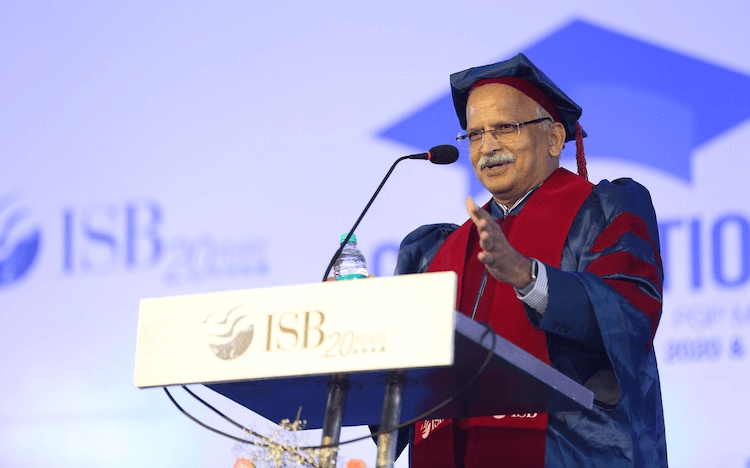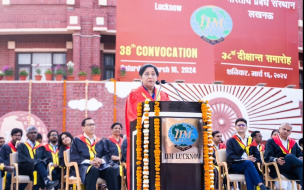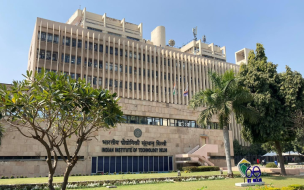Whether applying to ISB, an Indian Institute of Management, a state university, or a private college, BusinessBecause shares insights and tips to help you prep for your interview and increase your chances of success.
1. Make a good first impression
Start your interview on the right note. Apart from looking presentable, there are other ways to make a first impression and to ensure the panel sees you as an efficient and capable manager. For example:
- Smile first at the person who greets you, then at the other interviewers.
- Be seated when you are gestured to, and once seated, immediately make eye contact with the person opposite you, retaining your smile.
- Wish the panel 'good morning' or 'good afternoon', and if possible, share a confident handshake.
- Wait for the interview to begin with a confident half-smile and erect posture, preferably without using the backrest, hands resting on your lap.
2. Be positive and honest in your b-school interview
Positivity pays, especially when you are on a sticky wicket. A top school recently asked a candidate: “As an MBA aspirant in data analytics, do you know the basics of data mining and fusion techniques?” The candidate’s candid reply was: “I am eager to fill my knowledge gaps while pursuing an MBA at this prestigious school.” Although the applicant conveyed a lack of knowledge, her response did not go against her because it showed an eagerness to learn, and a sense of purpose to her MBA aspiration.
3. Master the interview Q&A pattern
There is a pattern on which MBA interview questions build that is similar at many schools. Zero-in on the school/s you have applied to, explore their interview formats, and work painstakingly on how to address the common questions.
The ISB interview consists of these broad categories:
- Work experience
- Future goals
- Guesstimates and puzzles
- Current affairs
- Hobbies
- Application-focused questions
Sample questions include: ‘Tell us something about yourself’; ‘tell us something that’s not in your application’; ‘define your career goals and how ISB can help you meet these'; ‘where do you see yourself in 3-5 years’; ‘is there anything you want to ask us’; and inevitably, ‘why should we select you?’.
It’s also worth knowing that ISB interviews are conducted mostly by alumni.
The IIMA interview consists of these categories:
- General
- Work-related
- General knowledge-related
- Hobbies and interests
Sample questions include: ‘Tell me about yourself’; ‘why you want to pursue MBA after your graduation?’; ‘define and explain the demand-supply law’; ‘what do you know about the 2G scam’; ‘which is your favorite book’, and inevitably, ‘your career goals after your MBA’.
IIMA interviews are mostly conducted by two or three panelists.
Also check the question structures of other IIMs: IIM Bengaluru, IIM Indore, IIM Kolkata, IIM Lucknow. And IIM Kozhikode.
4. Research the school thoroughly
There are currently around 5,500 MBA colleges in India. When asked, ‘why this school?’, be ready with your precise and thoroughly researched reply. Know about the faculty, campus, program curriculum, the pedagogy, student committees, inclusion and gender balance, networking opportunities, illustrious alumni, academics-industry interface, the range of electives, financial assistance, international collaborations, and of course, the alignment of the course with your career goals. Thorough knowledge about the institute you are interviewing at will demonstrate your genuine interest and keenness to study there. It can strengthen your claim for admission substantially.
5. Transform facts and figures into vivid stories – deploy the STAR technique
Even the most accomplished interviewees end up dishing out a dull, repetitive experience to the panelists with a dry facts-and-figures approach. To break this monotony mold, integrate storytelling in your answers. Create engaging narratives while describing your merits, achievements, or other marquee moments from your resume.
To improve your storytelling ability, practice scenarios with the STAR model – Situation, Task, Action, and Result. It arranges the story in a relatable sequence and makes it more enjoyable in a human-to-human context.
6. Think about what to ask the interview panel
When asked about your concerns or queries at the end of the interview, pose some relevant and purposeful questions. Examples include: ‘If I am admitted to your program, what would be your golden piece of advice to me?’; ‘several alumni described the culture here as conducive and cooperative; how would you describe campus life?’. If the panel includes alumni, pose questions such as ‘how was your own experience at this school?’, or ;'what has changed here since you graduated?’.
7. Some basic interview dos and don’ts
Dos
- Be confident but not over-confident to come across as brash
- Be a good listener, make sure you comprehend the question before answering it
- Demonstrate a genuine passion for the school and its program
- Take criticism or correction gracefully; do not react negatively or impulsively
- Most importantly, end the interview on a note of sincere gratitude such as: ‘I am keen to study here and do hope that I make the cut’
Don’ts
- Don’t play it cool or convey a lack of interest or enthusiasm
- Don’t make excuses but rather accept any mistakes
- Don’t oversell your achievements, describe them concisely
- Avoid negativity and uncertainty
- Never argue but instead politely debate
- Don’t repeat or ramble
- Don’t make your answers too long
Good luck!






